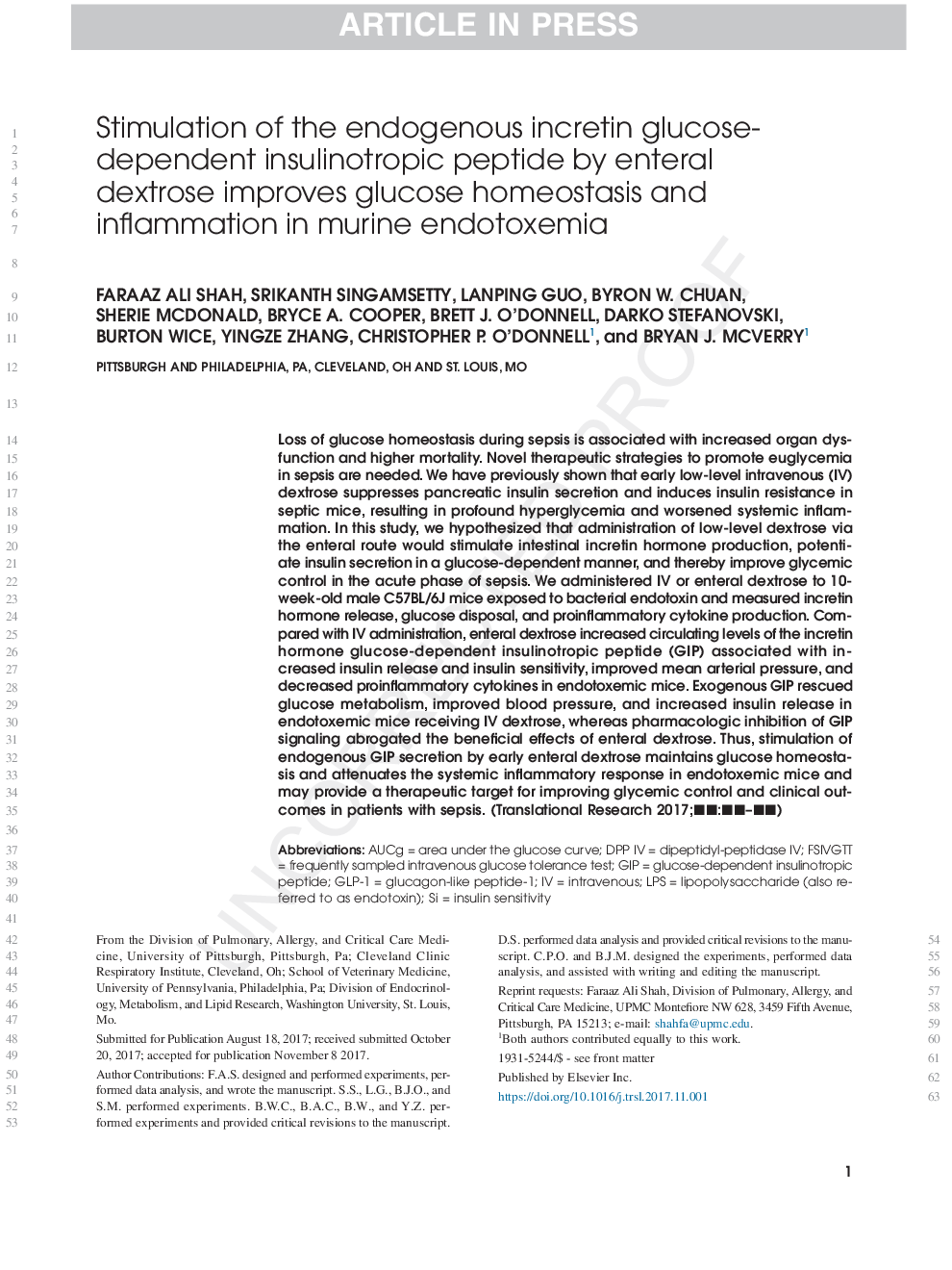| کد مقاله | کد نشریه | سال انتشار | مقاله انگلیسی | نسخه تمام متن |
|---|---|---|---|---|
| 8768985 | 1597917 | 2018 | 12 صفحه PDF | دانلود رایگان |
عنوان انگلیسی مقاله ISI
Stimulation of the endogenous incretin glucose-dependent insulinotropic peptide by enteral dextrose improves glucose homeostasis and inflammation in murine endotoxemia
ترجمه فارسی عنوان
تحریک مجاری انسولینتروپیک به تدریج از طریق تزریق انسولینتروپیک به وسیله دگزسترول انتالال باعث بهبودی هوموتاز گلوکز و التهاب در اندوتوکسمی می شود
دانلود مقاله + سفارش ترجمه
دانلود مقاله ISI انگلیسی
رایگان برای ایرانیان
کلمات کلیدی
LPSGLP-1GIPFSIVGTTDPP IVdipeptidyl-peptidase IVAUCGFrequently sampled intravenous glucose tolerance test - تست تحمل گلوکز داخل وریدی اغلب نمونه برداری می شودInsulin sensitivity - حساسیت به انسولینIntravenous - داخل وریدیglucagon-like peptide-1 - پپتید 1-گلوکاگون-مانندglucose-dependent insulinotropic peptide - پپتید انسولینتروپیک وابسته به گلوکز
موضوعات مرتبط
علوم پزشکی و سلامت
پزشکی و دندانپزشکی
پزشکی و دندانپزشکی (عمومی)
چکیده انگلیسی
Loss of glucose homeostasis during sepsis is associated with increased organ dysfunction and higher mortality. Novel therapeutic strategies to promote euglycemia in sepsis are needed. We have previously shown that early low-level intravenous (IV) dextrose suppresses pancreatic insulin secretion and induces insulin resistance in septic mice, resulting in profound hyperglycemia and worsened systemic inflammation. In this study, we hypothesized that administration of low-level dextrose via the enteral route would stimulate intestinal incretin hormone production, potentiate insulin secretion in a glucose-dependent manner, and thereby improve glycemic control in the acute phase of sepsis. We administered IV or enteral dextrose to 10-week-old male C57BL/6J mice exposed to bacterial endotoxin and measured incretin hormone release, glucose disposal, and proinflammatory cytokine production. Compared with IV administration, enteral dextrose increased circulating levels of the incretin hormone glucose-dependent insulinotropic peptide (GIP) associated with increased insulin release and insulin sensitivity, improved mean arterial pressure, and decreased proinflammatory cytokines in endotoxemic mice. Exogenous GIP rescued glucose metabolism, improved blood pressure, and increased insulin release in endotoxemic mice receiving IV dextrose, whereas pharmacologic inhibition of GIP signaling abrogated the beneficial effects of enteral dextrose. Thus, stimulation of endogenous GIP secretion by early enteral dextrose maintains glucose homeostasis and attenuates the systemic inflammatory response in endotoxemic mice and may provide a therapeutic target for improving glycemic control and clinical outcomes in patients with sepsis.
ناشر
Database: Elsevier - ScienceDirect (ساینس دایرکت)
Journal: Translational Research - Volume 193, March 2018, Pages 1-12
Journal: Translational Research - Volume 193, March 2018, Pages 1-12
نویسندگان
Faraaz Ali Shah, Srikanth Singamsetty, Lanping Guo, Byron W. Chuan, Sherie McDonald, Bryce A. Cooper, Brett J. O'Donnell, Darko Stefanovski, Burton Wice, Yingze Zhang, Christopher P. O'Donnell, Bryan J. McVerry,
